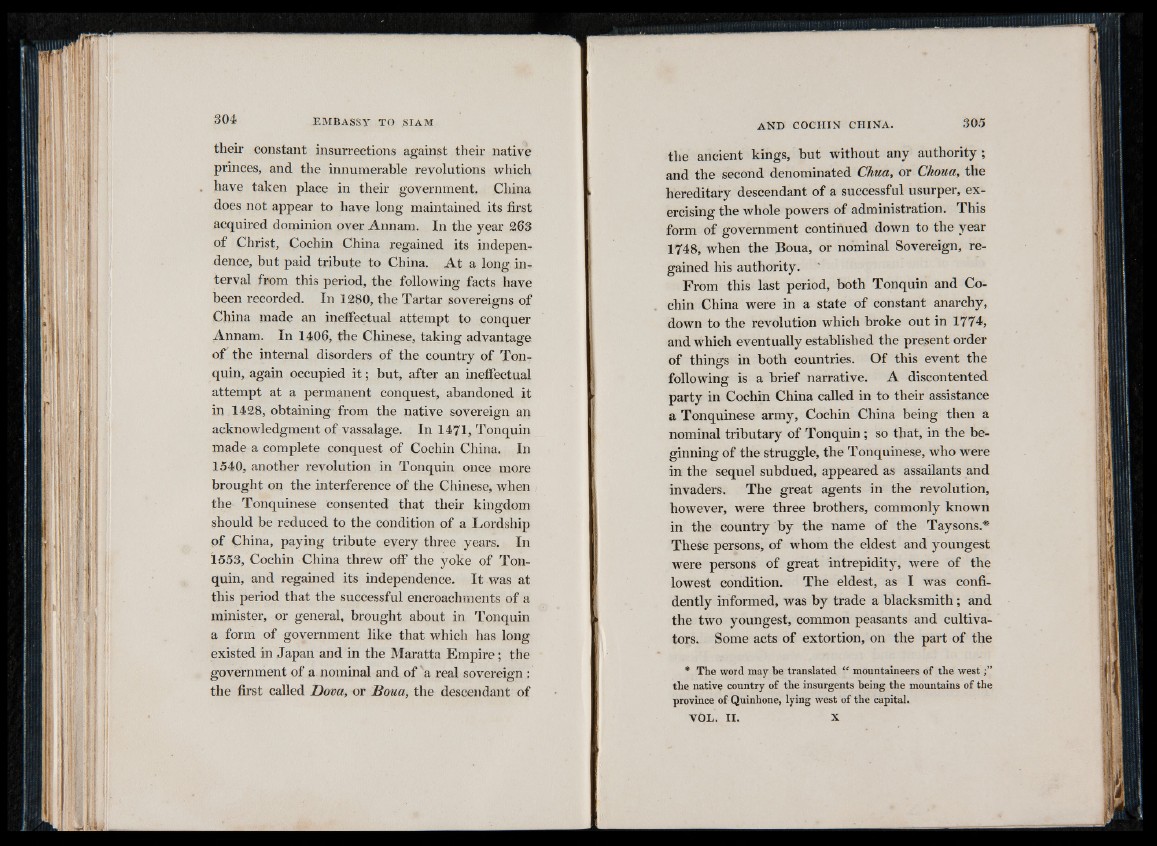
their constant insurrections against their native
princes, and the innumerable revolutions which
have taken place in their government. China
does not appear to have long maintained its first
acquired dominion over Annam. In the year 263
of Christ, Cochin China regained its independence,
but paid tribute to China. A t a long interval
from this period, the following facts have
been recorded. In 1280, the Tartar sovereigns of
China made an ineffectual attempt to conquer
Annam. In 1406, the Chinese, taking advantage
off the internal disorders of the country of Ton-
quin, again occupied i t ; but, after an ineffectual
attempt at a permanent conquest, abandoned it
in 1428, obtaining from the native sovereign an
acknowledgment of vassalage. In 1471, Tonquin
made a complete conquest of Cochin China. In
1540, another revolution in Tonquin once more
brought on the interference of the Chinese, when
the Tonquinese consented that their kingdom
should be reduced to the condition of a Lordship
of China, paying tribute every three years. In
1553, Cochin China threw off the yoke of Tonquin,
and regained its independence. I t was at
this period that the successful encroachments of a
minister, or general, brought about in Tonquin
a form of government like that which has long
existed in Japan and in the Maratta Empire; the
government of a nominal and of 'a real sovereign ;
the first called Dova, or Boua, the descendant of
the ancient kings, but without any authority ;
and the second denominated Chua, or Choua, the
hereditary descendant of a successful usurper, exercising
the whole powers of administration. This
form of government continued down to the year
1748, when the Boua, or nominal Sovereign, regained
his authority.
From this last period, both Tonquin and Cochin
China were in a state of constant anarchy,
down to the revolution which broke out in 1774,
and which eventually established the present order
of things in both countries. Of this event the
following is a brief narrative. A discontented
party in Cochin China called in to their assistance
a Tonquinese army, Cochin China being then a
nominal tributary of Tonquin ; so that, in the beginning
of the struggle, the Tonquinese, who were
in the sequel subdued, appeared as assailants and
invaders. The great agents in the revolution,
however, were three brothers, commonly known
in the country by the name of the Tay sons.*
These persons, of whom the eldest and youngest
were persons of great intrepidity, were of the
lowest condition. The eldest, as I was confidently
informed, was by trade a blacksmith ; and
the two youngest, common peasants and cultivators.
Some acts of extortion, on the part of the
* The word may be translated “ mountaineers of the west;”
the native country of the insurgents being the mountains of the
province of Quinhone, lying west of the capital.
VOL. II. X